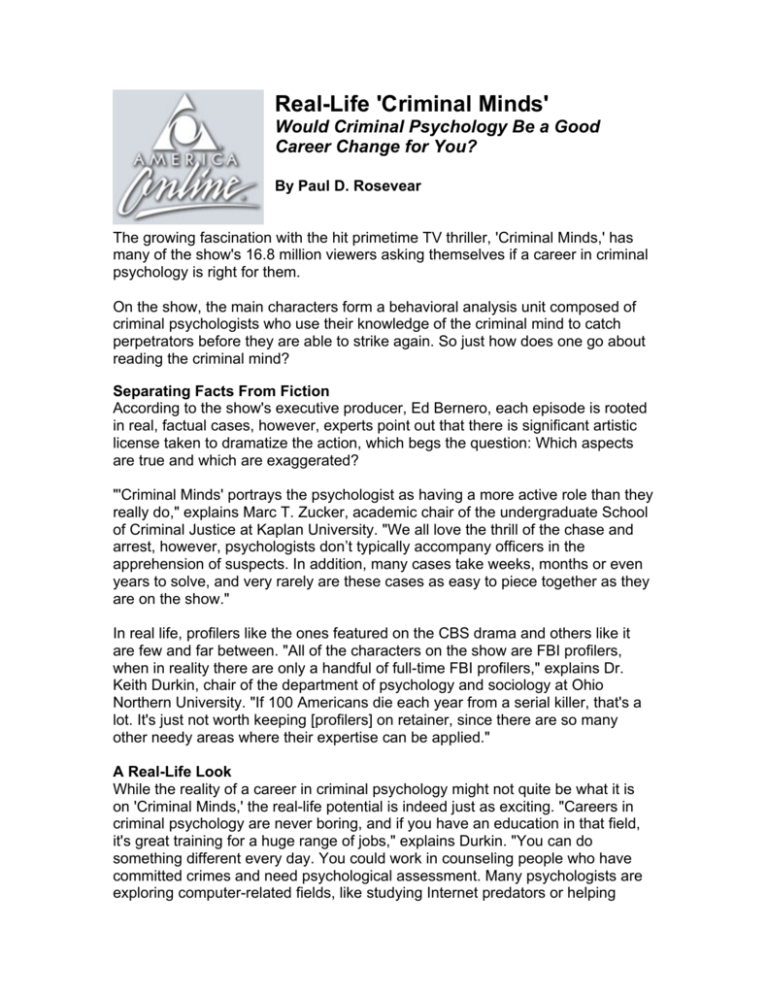
Real-Life 'Criminal Minds'
Would Criminal Psychology Be a Good
Career Change for You?
By Paul D. Rosevear
The growing fascination with the hit primetime TV thriller, 'Criminal Minds,' has
many of the show's 16.8 million viewers asking themselves if a career in criminal
psychology is right for them.
On the show, the main characters form a behavioral analysis unit composed of
criminal psychologists who use their knowledge of the criminal mind to catch
perpetrators before they are able to strike again. So just how does one go about
reading the criminal mind?
Separating Facts From Fiction
According to the show's executive producer, Ed Bernero, each episode is rooted
in real, factual cases, however, experts point out that there is significant artistic
license taken to dramatize the action, which begs the question: Which aspects
are true and which are exaggerated?
"'Criminal Minds' portrays the psychologist as having a more active role than they
really do," explains Marc T. Zucker, academic chair of the undergraduate School
of Criminal Justice at Kaplan University. "We all love the thrill of the chase and
arrest, however, psychologists don’t typically accompany officers in the
apprehension of suspects. In addition, many cases take weeks, months or even
years to solve, and very rarely are these cases as easy to piece together as they
are on the show."
In real life, profilers like the ones featured on the CBS drama and others like it
are few and far between. "All of the characters on the show are FBI profilers,
when in reality there are only a handful of full-time FBI profilers," explains Dr.
Keith Durkin, chair of the department of psychology and sociology at Ohio
Northern University. "If 100 Americans die each year from a serial killer, that's a
lot. It's just not worth keeping [profilers] on retainer, since there are so many
other needy areas where their expertise can be applied."
A Real-Life Look
While the reality of a career in criminal psychology might not quite be what it is
on 'Criminal Minds,' the real-life potential is indeed just as exciting. "Careers in
criminal psychology are never boring, and if you have an education in that field,
it's great training for a huge range of jobs," explains Durkin. "You can do
something different every day. You could work in counseling people who have
committed crimes and need psychological assessment. Many psychologists are
exploring computer-related fields, like studying Internet predators or helping
investigate online fraud."
And, as Durkin points out, the potential for criminal psychology is every evolving.
"It’s impossible to know where the future is going to take the field," he says. "I
didn't know I was going to help find Internet sex offenders and get them off the
streets so they don’t harm children [when I started my career]. There was no
Internet when I went to school!"
With the rapid growth of Internet-related criminal activity, the need for tech savvy,
educated law enforcement workers will continue to expand. According to the
Bureau of Labor Statistics, career opportunities in all realms of law enforcement
will steadily grow anywhere between nine and 14 percent through 2014.
But even as cutting-edge technology forces career psychologists to redefine their
roles in law enforcement, there are also plenty of traditional aspects of the career
that will remain unchanged, like the research component to psychology careers
not necessarily depicted on the show.
"Much of a psychologist's time is spent in front of a computer screen, reading
books or articles, and interviewing suspects and convicted offenders," he says. In
addition, a criminal psychology background may also often be used to educate
and inform other people involved in solving crimes. "Psychologists also write
books, publish papers, lecture, and train law enforcement agents interested in
using psychological elements in their investigations."
Crime in the Classroom
In order to explore any of these career avenues, you’ll need the appropriate
training. "A majority of psychologists in this field have doctoral degrees in
psychology, however, a master's degree may fulfill the requirement of some
departments for certain positions," says Zucker. Of course, opportunities in this
line of work aren't limited to those with advanced degrees. "Individuals who get a
bachelor's degree in psychology can use their education to work as a law
enforcement agent and become part of their profiling team, but in a different
capacity than a psychologist."
Dr. Steven Hundersmarck, a psychology professor at Ohio Northern University
who trains police alongside Durkin, says the main thrust of criminal psychology is
examining the "why" behind the crimes, more so than the "how."
"The focus [of the job] is on studying what drives individuals to do these things,"
he says. "There are very particular motivations behind why a killer ties someone
up, for example, or targets a prostitute, or kills in a serial fashion."
Hundersmarck illustrates such concepts to his students by requiring they study
interviews with criminals, past cases, and by even constructing model crime
scenes for his students to analyze. "When it comes to interviewing, my students
learn to study a criminal's answers to questions, but also from the manner in
which he or she answers them," he explains. "With the model crime scenes,
students use inductive and deductive reasoning to speculate what type of person
the criminal might be. Inductive reasoning uses stats, crime reports, and
information already known, whereas deductive reasoning is related to the crime
scene itself."
Life in the Crime-Light
The cast of 'Criminal Minds' makes such reasoning, behavioral analysis, and
criminal psychology look like a thrilling career for anybody with a fascination for
investigating illegal activity. But the reality isn't as neat and tidy as the show
makes it seem.
"This type of job isn't for everybody," says Durkin. "I've seen it get into people's
heads. They get a real cynical view of human nature and they become
distrusting. Others have a difficult time handling the sexual component inherent
to most serial killers."
Still, when your personality suits the work, criminal psychologists claim you won't
find more rewarding work. "We get the chance to learn why horrendous crimes
occur, and how to prevent them in the future," says Dr. David Kirshner,
psychologist and author of 'Adoption: Uncharted Waters' (Juneau Press, 2006),
which features case studies of notorious criminals who were adopted.
"Let's face it, there are some bad people that are hardcore psychopaths. But in
most cases I've seen, you can get at the truth, educate the public, and implement
early treatment to prevent these things from happening," Kirshner explains. "That
is the ultimate reward.”
A psychology degree and a law enforcement career may not have you flying
around the country in a fancy jet to track serial killers like the characters 'Criminal
Minds.' However, it will most certainly open a window into the mind of a criminal - if you're bold enough to look.
© 2006 Classes USA, Inc. All rights reserved.







